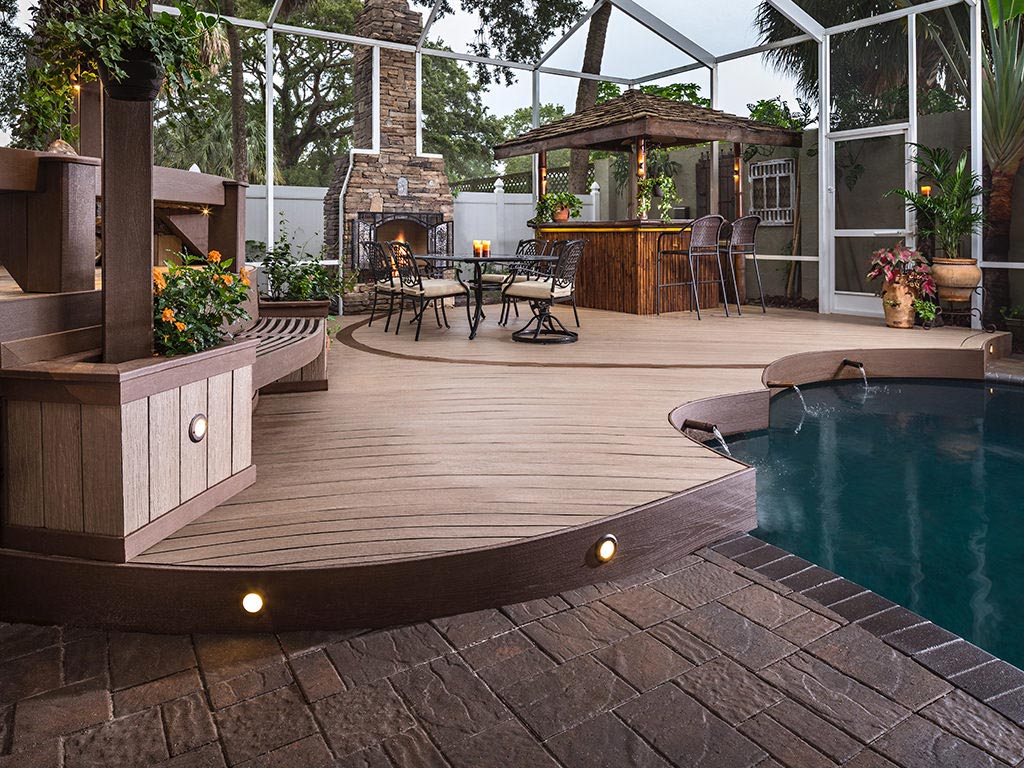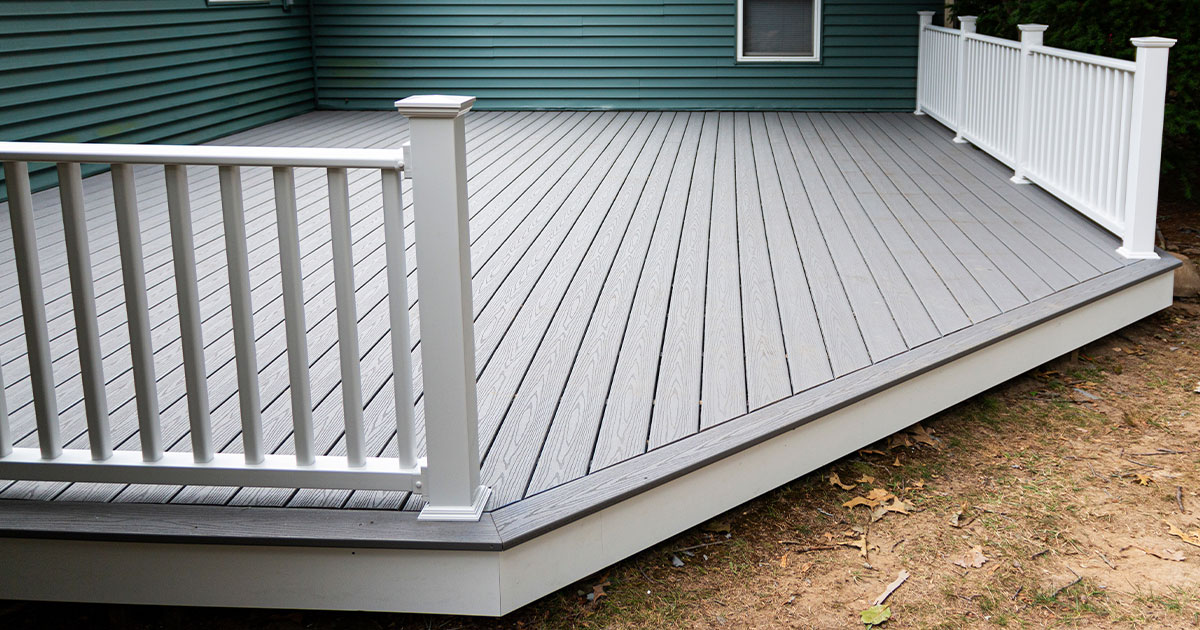From traditional to contemporary styles, deck installation Austin services can match your aesthetic goals.
From traditional to contemporary styles, deck installation Austin services can match your aesthetic goals.
Blog Article
Just how to Select the Right Materials for Your Deck Setup Task
Choosing the suitable materials for your deck setup project can seem complicated. The trick is to stabilize your budget plan, style choices, and way of living needs to create a deck that will improve your exterior area for years to come.
Understanding the Various Sorts Of Deck Materials
When embarking on a deck installment job, the choice of materials ends up being a critical decision. Compound products, on the other hand, are a mix of timber and plastic, supplying toughness and resistance to weather elements. By comprehending these differences, homeowners can make a more informed decision on the most appropriate deck product for their certain needs.
Assessing the Sturdiness and Upkeep Demands of Deck Materials
Assessing the resilience and upkeep requirements of deck materials is an important action in deck installation. Toughness involves the product's ability to hold up against extreme climate condition, wear and tear, and its longevity. For instance, cedar and redwood are normally immune to rot and bugs, making them resilient selections. On the other hand, pressure-treated wood, while durable, might call for even more upkeep as a result of its susceptibility to splitting and warping.
Comprehending maintenance demands is similarly crucial. Some materials require regular sealing or tarnishing to keep their appearance and resist moisture damages, while others, like composite outdoor decking, require less maintenance. By evaluating these elements, one can pick the most suitable decking product, guaranteeing a balance in between resilience, maintenance requirements, and visual charm.
Cost Evaluation: Comparing Timber and Compound Decking
Although cost might at first look like an additional concern, it is a substantial variable when comparing wood and composite decking. Wood, generally a less costly choice, has a reduced upfront price. Over time, upkeep costs can accumulate, possibly making timber much more pricey in the long run. These maintenance expenses might consist of staining, sealing, or changing harmed boards. On the various other hand, composite outdoor decking, while costlier at first, needs less upkeep, potentially reducing long-term expenses. It's essential to keep in mind that composite decking isn't impervious to use and tear, and substitute costs can be high. Possible deck proprietors must consider their budget and willingness to preserve their decks when choosing in between wood and composite outdoor decking.
Appearances and Layout Adaptability of Decking Products
Natural wood outdoor decking offers a timeless, ageless appearance, while composite products offer a large range of shades and structures to suit varied tastes and designs. Composite products, while less flexible in design, are still versatile sufficient for a lot of deck designs. These factors, consequently, are vital determinants in the choice of decking material.
Environmental Influence of Decking Products
When choosing outdoor decking products, one must take into consideration not only visual appeals and toughness, however additionally the ecological influence. It is essential to evaluate the sustainability of materials and discover recycled outdoor decking choices. Moreover, understanding the possible impact on neighborhood ecological communities will make certain a more ecologically responsible selection.
Evaluating Product Sustainability
In the realm of deck building, analyzing material sustainability is an essential step. Composite outdoor decking products commonly incorporate wood and plastic, reducing the need for new hardwood yet raising reliance on fossil gas - deck installation austin. Thus, the choice of outdoor decking materials need to balance capability, aesthetic appeals, cost, and sustainability to guarantee a responsible and resilient installment.
Recycled Outdoor Decking Alternatives

Compound decking is specifically popular as a result of its sturdiness and simplicity of maintenance. It's immune to rot, pests, and fading, making it a lasting alternative. Recycled plastic decking, on the other hand, is extremely resistant and calls for minimal maintenance. While these materials may lug a higher initial price, their durability and lowered environmental impact make them a sensible investment for the eco-conscious homeowner.

Influence On Local Communities
While the advantages of making use of recycled materials for decking can not be overemphasized, it's just as vital to consider the broader ecological implications of these choices. The removal, handling, and transport of products can greatly affect regional ecological communities. Deforestation for lumber decking adds to habitat loss and environment change. Even the production of composite products can launch unsafe discharges. On the other hand, using recycled or sustainably sourced materials can help mitigate these effects. Moreover, considering the lifespan of products can lower environmental impact; longer-lasting choices call for much less frequent replacement, therefore conserving sources. Proper disposal of old outdoor decking is essential to minimizing garbage dump waste. Basically, an eco-conscious deck job needs cautious material option, sustainable sourcing, and responsible disposal.
Making Your Last Decision: Tips for Choosing the Finest Deck Products
As the short article changes into the subtopic of "Making Your Decision: Tips for Picking the most effective Deck Products", it is vital to recognize the range of deck materials readily available. Striking an equilibrium between resilience and looks is essential in find more this choice procedure. The complying with conversation will certainly guide visitors in making an enlightened choice based on these crucial considerations.
Recognizing Different Deck Materials
The task of picking the appropriate products for your deck installation can seem discouraging due to the large range of options readily available. Plastic or PVC decks are even more durable and call for much less upkeep than composite products, however they can look much less all-natural. Aluminum decks are strong, light-weight, and immune to rot, yet they are additionally the most costly choice.
Sturdiness vs. Looks Equilibrium
Balancing durability with appearances can be an obstacle when picking deck materials. The decision commonly boils down to personal preferences and the deck's planned use. High-traffic locations might demand resilient materials like composite decking, which withstands wear and tear yet may lack the all-natural beauty of timber. On the various other hand, timber supplies a classic charm and warmth that synthetic products struggle to duplicate. It requires more upkeep and might not last as long. Consequently, home owners require to find this strike an equilibrium, thinking about both the deck's practical demands and their visual preferences. By doing so, they blog here can guarantee their deck continues to be a useful and eye-catching outdoor area for several years ahead.
Final thought
To conclude, choosing the appropriate products for your deck setup task requires cautious factor to consider of aspects such as durability, maintenance, price, aesthetic appeals, and environmental impact. Whether you go with traditional wood or composite materials, your option ought to straighten with your budget plan, style preferences, and way of life. Inevitably, the very best outdoor decking material is one that enhances your exterior space and gives pleasure for several years ahead.
Report this page